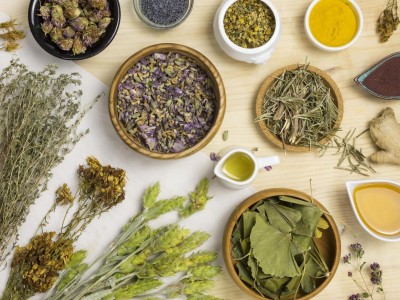According to the health approach of Natural Hygiene, each and every medicine, no matter what type, has some degree of toxicity, and therefore, side effects.
I would like to quote some parts of T.C.Fry’s book “Life Science” when referring to Herbs:
“All herbs contain poisonous volatile oils and alkaloids. All herbs are fatal when taken in large enough doses. Even moderate amounts of certain herbs can cause vomiting, diarrhoea, fever, headaches, and spontaneous abortions.
Many people do not realize that the herbs they take are in fact poisoning them. The reason? Herbs are taken in small amounts—usually small enough not to occasion a serious and painful reaction, but still enough to cause the body to react radically and expeditiously to eliminate them.
If herbs are not harmful, why must they be taken in such small amounts? Like pepper, spices, and condiments, herbs cannot be ingested in amounts larger than a tablespoon or so. Even more telling is the taste of herbs themselves. Almost without exception, herbs are bitter, strong, and foul tasting. This is a warning to the body not to eat such substances.
Yet with pills, capsules, and infusions, the herbalists have found ways to sneak a plant into the body that it would never relish or desire normally.
When they are introduced into the body, the vital organism attempts to expel these poisons as quickly as possible. The body protects itself from drugging and poisoning, whether these poisons come from a pharmacist's shelf or from nature.
Different herbs may occasion different bodily reactions. Fevers, sweating, diarrhoea, increased or decreased circulation are all signs of a body trying to eliminate herbal toxins and are not indications that an herb is working some cure or the other.
No matter how herbs are used or what they're used as (expectorants, stimulants, astringents, etc.) they always, without exception, add to the body's toxic load, which is the real disease.
For example, high-blood pressure is a very common ailment among Americans because of the tremendous amounts of salt they eat in their heavy meat and processed food diet. A vegetable alkaloid found in certain herbs called reserpine has been used to reduce blood pressure. Garlic, long touted as a wonder herb, is also a supposedly effective agent in reducing blood pressure.
What sometimes occurs is that people with high-blood pressure ingest garlic and other herbs to correct this condition. At the same time, however, they continue with their old diet and eat large amounts of salt.
When this happens, the symptom of high-blood pressure is hidden by the symptoms of the herbal poisoning. At the same time, the old habits and diet that kept the blood pressure high are not modified. The high-blood pressure is simply a signal by the body that something is wrong—like diet or lifestyle.
Garlic and other herbs may mask one symptom of a high-salt diet, but they can do nothing about the kidney damage and cellular destruction that also accompanies salt eating.
Swallowing herbs is like swallowing any other pill or drug. The fact that they grow naturally does not give them any extra or safe curative properties.
Ginger, for example, causes the digestive system to hurry the food through before being completely digested. Thus, these seasoning herbs have gained an undeserved reputation as "digestive aids." Instead of aiding digestion, their use occasions the body to rapidly expel them along with the food they seasoned.
Garlic and onions, two of the most popular flavoring herbs, are full of noxious toxins, like mustard oil and allicin. Parsley is also a strong herb whose use can overstimulate the kidneys. The toxic component of aloe vera is the glycoside aloin; in sassafras it's safrole; and in the Indian snake root, it's the alkaloid reserpine.
The cooking and seasoning herbs are not harmless additions to the diet as is popularly believed. Their use disrupts digestion and places an added load on the eliminative system.
If the drug or herb is particularly toxic; if it's given in a large dose relative to the subject's vitality (supply of nerve energy); or if the subject is particularly low in vitality, the result of its administration may be almost complete cessation of the disease process. The body may be temporarily incapable of ejecting the toxins accumulated in the body or those in the drug or herb.
Disease is a body process of toxin elimination. Being capable of handling only a limited amount of toxic matters at a time, the body temporarily halts the disease process and devotes its energies to ejecting the new offending substance."
Another book I would recommend to consult before taking any herb is Tayler’s “Honest Herbal”. You will learn the benefits and side effects of most herbs. For example, ginger may cause depression of the central nervous system and cardiac arrythmias; ginkgo reduce clotting time; salvia when consumed over a long period of time may lead to mental and physical deterioration; St John’s wort may cause photosensitivity; etc.
I think that when one is hit by an illness the first reaction should be to find the source of this health problem, be it food, stress, emotional problem, lack of sleep, or any lifestyle mistake. If all these have been tried to be straightened out and the health is not improving, then natural medicines or therapies may be a temporary useful remedy; but you must be aware that it is just a relieve and the real cause of your disease has not been addressed, so never stop trying to find out where the health condition comes from.
I would like to quote some parts of T.C.Fry’s book “Life Science” when referring to Herbs:
“All herbs contain poisonous volatile oils and alkaloids. All herbs are fatal when taken in large enough doses. Even moderate amounts of certain herbs can cause vomiting, diarrhoea, fever, headaches, and spontaneous abortions.
Many people do not realize that the herbs they take are in fact poisoning them. The reason? Herbs are taken in small amounts—usually small enough not to occasion a serious and painful reaction, but still enough to cause the body to react radically and expeditiously to eliminate them.
If herbs are not harmful, why must they be taken in such small amounts? Like pepper, spices, and condiments, herbs cannot be ingested in amounts larger than a tablespoon or so. Even more telling is the taste of herbs themselves. Almost without exception, herbs are bitter, strong, and foul tasting. This is a warning to the body not to eat such substances.
Yet with pills, capsules, and infusions, the herbalists have found ways to sneak a plant into the body that it would never relish or desire normally.
When they are introduced into the body, the vital organism attempts to expel these poisons as quickly as possible. The body protects itself from drugging and poisoning, whether these poisons come from a pharmacist's shelf or from nature.
Different herbs may occasion different bodily reactions. Fevers, sweating, diarrhoea, increased or decreased circulation are all signs of a body trying to eliminate herbal toxins and are not indications that an herb is working some cure or the other.
No matter how herbs are used or what they're used as (expectorants, stimulants, astringents, etc.) they always, without exception, add to the body's toxic load, which is the real disease.
For example, high-blood pressure is a very common ailment among Americans because of the tremendous amounts of salt they eat in their heavy meat and processed food diet. A vegetable alkaloid found in certain herbs called reserpine has been used to reduce blood pressure. Garlic, long touted as a wonder herb, is also a supposedly effective agent in reducing blood pressure.
What sometimes occurs is that people with high-blood pressure ingest garlic and other herbs to correct this condition. At the same time, however, they continue with their old diet and eat large amounts of salt.
When this happens, the symptom of high-blood pressure is hidden by the symptoms of the herbal poisoning. At the same time, the old habits and diet that kept the blood pressure high are not modified. The high-blood pressure is simply a signal by the body that something is wrong—like diet or lifestyle.
Garlic and other herbs may mask one symptom of a high-salt diet, but they can do nothing about the kidney damage and cellular destruction that also accompanies salt eating.
Swallowing herbs is like swallowing any other pill or drug. The fact that they grow naturally does not give them any extra or safe curative properties.
Ginger, for example, causes the digestive system to hurry the food through before being completely digested. Thus, these seasoning herbs have gained an undeserved reputation as "digestive aids." Instead of aiding digestion, their use occasions the body to rapidly expel them along with the food they seasoned.
Garlic and onions, two of the most popular flavoring herbs, are full of noxious toxins, like mustard oil and allicin. Parsley is also a strong herb whose use can overstimulate the kidneys. The toxic component of aloe vera is the glycoside aloin; in sassafras it's safrole; and in the Indian snake root, it's the alkaloid reserpine.
The cooking and seasoning herbs are not harmless additions to the diet as is popularly believed. Their use disrupts digestion and places an added load on the eliminative system.
If the drug or herb is particularly toxic; if it's given in a large dose relative to the subject's vitality (supply of nerve energy); or if the subject is particularly low in vitality, the result of its administration may be almost complete cessation of the disease process. The body may be temporarily incapable of ejecting the toxins accumulated in the body or those in the drug or herb.
Disease is a body process of toxin elimination. Being capable of handling only a limited amount of toxic matters at a time, the body temporarily halts the disease process and devotes its energies to ejecting the new offending substance."
Another book I would recommend to consult before taking any herb is Tayler’s “Honest Herbal”. You will learn the benefits and side effects of most herbs. For example, ginger may cause depression of the central nervous system and cardiac arrythmias; ginkgo reduce clotting time; salvia when consumed over a long period of time may lead to mental and physical deterioration; St John’s wort may cause photosensitivity; etc.
I think that when one is hit by an illness the first reaction should be to find the source of this health problem, be it food, stress, emotional problem, lack of sleep, or any lifestyle mistake. If all these have been tried to be straightened out and the health is not improving, then natural medicines or therapies may be a temporary useful remedy; but you must be aware that it is just a relieve and the real cause of your disease has not been addressed, so never stop trying to find out where the health condition comes from.









 Gemma Calzada is a Holistic Nutritionist Ph.D. and a certified GAPS practitioner, accredited by ASCA. Her mission is to improve health through nutrition and to help people suffering from a dietary intolerance to live happily.
Gemma Calzada is a Holistic Nutritionist Ph.D. and a certified GAPS practitioner, accredited by ASCA. Her mission is to improve health through nutrition and to help people suffering from a dietary intolerance to live happily. 
